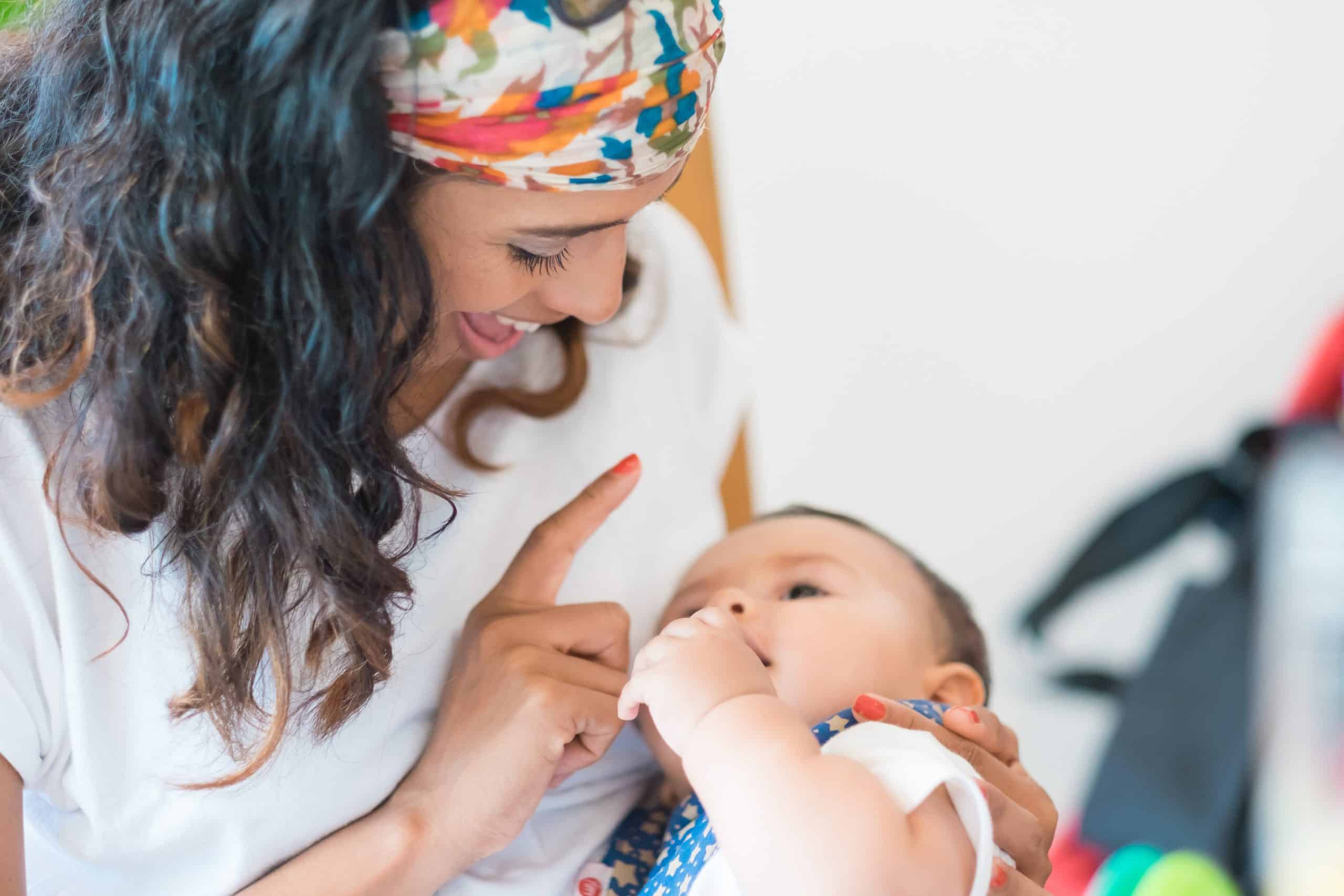Birth to 12 Months: Social-Emotional Development

Social-emotional development is vital for infants, toddlers, and preschoolers as it helps them build healthy relationships, manage emotions, and develop social skills. Early support in areas like empathy, emotional regulation, and cooperation fosters resilience, mental well-being, and future academic success, setting the stage for positive lifelong outcomes.
Starting from birth, babies are learning who they are by how they are treated.
Loving relationships give young children a sense of comfort, safety, confidence, and encouragement. They teach young children how to form friendships, communicate emotions, and to deal with challenges. Strong, positive relationships also help children develop trust, empathy, compassion, and a sense of right and wrong.
Starting from birth, babies are learning who they are by how they are treated. Through everyday interactions, parents, relatives and caregivers send babies messages like: You’re clever. You’re good at figuring things out. You’re loved. You make me laugh. I enjoy being with you. These messages shape a baby’s self-esteem.
A 6-month-old laughs and laughs as his mother holds a napkin over his face, and then drops it to say, “Peek-a-boo!” Whenever his mother tries to put the napkin back on the table, the baby says, “eh, eh, eh” and kicks his arms and legs to let her know that he wants her to play the game again. She follows his lead and keeps playing until he gets bored. This baby is discovering that relationships with others are satisfying and pleasurable, that he is a good communicator, and that his needs and desires are important.
What You Can Do
Provide babies with responsive care.
Responsive care means matching your caregiving to what your baby needs. For example, your 10-month-old might start kicking, babbling, and grabbing at mealtime to show you he really wants to hold his own spoon. You know that he’s not yet able to feed himself, so you give him a baby spoon to hold in his hands while you continue feeding him with another. This is responsive care because you took the time to think about what the baby’s behavior meant and figured out a way to support him.
In your work:
- Get to know your baby. What are his likes and dislikes? Which toys are his favorites? What daily schedule works for him?
- Build open and collaborative relationship with your child’s caregiver(s). Talk to your child’s caregivers about your baby—her personality, what she likes to do, what calms her, what upsets her. Share your baby’s usual daily schedule and typical activities. Learning more about your baby (and your family) helps caregivers meet your child’s needs. Collaborating with caregivers helps to ensure that each of you feels respected and supported.
Support babies’ developing skills.
Babies learn best when you let them play, explore, and follow their interests. They develop new skills when you give them just enough help so that they can master a challenge without becoming overly frustrated. For example, if you see a five-month-old trying to roll over, you may hold a toy to his side so that he reaches over with his body to grab it.
In your work:
- Delight in your baby’s discoveries. You found me! You pulled away the scarf hiding my face and here I am! x Build on the skills your baby already has. For example, if your baby is trying to build with blocks and has stacked two, put a third one on top and hand her a fourth block for her tower.
Be affectionate and nurturing.
Touching, holding, comforting, rocking, singing and talking to your baby all send the message that he is special and loved. While it’s easy to be affectionate when babies are cute and cuddly, it’s also important to nurture babies when they are difficult, fussy, crying a lot or colicky. When you can be there for your baby during the tough times, children learn that they are loved for who they are—no matter what.
In your work:
- Give hugs and kisses. Let your baby know how loved she is.
- Be patient during the tough times. Colic, crying and fussiness are part of babyhood. When you can support babies even at their most difficult, you are letting them know they can trust and rely on you. This makes them feel safe and makes it more likely they will learn to calm themselves as they grow.
Help your child feel safe and secure.
You help your baby feel safe and secure when you respond to her cries and other communications—for example, picking your baby up when she lifts her arms in the air as if to say, “Up!” Babies also feel secure when they get lots of affection from you and when their days are predictable. It is the love and trust you share that helps your child learn that you will always be there for her. This trust gives her confidence.
In your work:
- Be a safe “home base” for your baby. Watch how your child crawls away, then comes back to check-in with you. He wants to be sure you are still there and may be looking for some encouragement to explore some more.
- Establish routines for your baby. Knowing what to expect helps babies feel safe, confident, and in control of their world. Try to keep daily routines in the same order and at the same time each day. For example, there may be a morning walk, then diaper change, then bottle, then stories.
Look for ways to make your home culture part of your child’s everyday routines.
A child’s culture is an important part of who he is. The connection he has to his culture shapes his identity and self-esteem in healthy and positive ways.
In your work:
- Teach your child’s caregivers the words your family uses for important people mother, father, grandparents) and things (bottle, blanket, pacifier, etc.).
- Choose books and music that reflect your home culture. These are often available at your public library for no charge and will quickly become a beloved part of your child’s daily routines—bedtime, bath-time, or just driving in the car.
Read More


